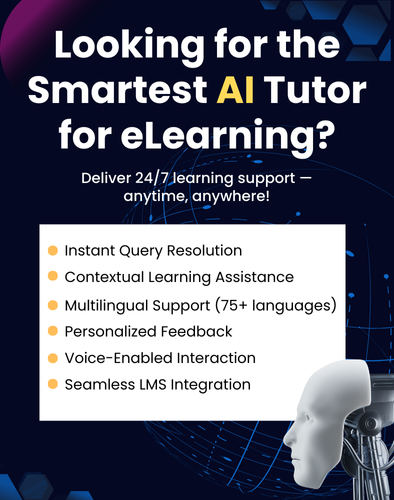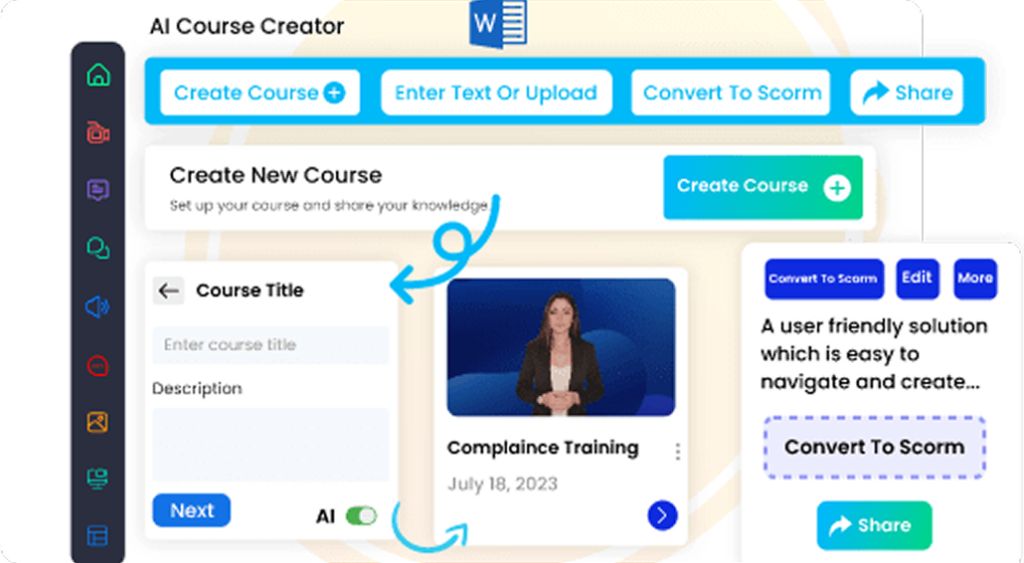Introduction
As the world of work continues to evolve, professionals must stay ahead of the curve to thrive. In 2025, the need for continuous learning is more important than ever, with rapid advancements in technology, management, and industry-specific knowledge. eLearning courses are a flexible and effective way to boost your career, develop new skills, and increase your value in the workforce.
Whether you’re looking to enhance your leadership abilities, stay up to date with emerging technologies, or improve your soft skills, here are 15 must-take eLearning courses for professionals in 2025, all available through the Cognispark AI Course Catalog.
Table of Content
1. AI and Machine Learning Fundamentals
What Is AI and Machine Learning?
Why It’s Important:
AI and ML are crucial because they empower businesses to work smarter and more efficiently. From data analysis to automation, AI is transforming industries, making it essential for professionals to understand the basics.
Benefits of Using AI and Machine Learning
- Automation: Streamlines repetitive tasks, saving time and reducing human error.
- Improved Decision-Making: AI analyzes large datasets to provide actionable insights.
- Competitive Advantage: Mastering AI allows professionals to stay ahead in rapidly evolving industries.
Benefits of Using AI and Machine Learning
- Comprehensive Content: Ensure the course covers both foundational concepts and practical applications.
- Hands-on Learning: Look for courses that offer real-world projects and use of AI tools.
- Reputation and Certification: Check if the course offers certifications recognized by the industry.
Where to Learn:
Cognispark AI Course Catalog: AI and Machine Learning for Beginners and Advanced Learners
Explore Our eLearning Course Catalog
Access 100+ of fully editable, SCORM-compatible courses featuring an integrated AI Tutor. Seamlessly compatible with any LMS, these courses are designed to elevate your training programs.
Explore Course Catalog2. Project Management Certification
What Is Project Management?
Project management involves the planning, execution, and oversight of projects to ensure they are completed on time, within scope, and on budget. Effective project managers lead teams and navigate challenges to deliver successful results.
Why It’s Important:
Project management skills are vital for professionals across industries, helping them meet deadlines, manage resources, and lead teams to success. Certification such as PMP (Project Management Professional) is often required for managerial roles.
Benefits of Using Project Management
- Efficiency: Helps in the smooth execution of projects, optimizing resource allocation.
- Risk Mitigation: Identifies potential risks early, allowing for proactive solutions.
- Career Advancement: Certification increases job prospects and salary potential.
Things to Look for in Project Management Courses
- Certifications Ensure the course prepares you for certifications like PMP or Agile.
- Practical Focus: The course should provide tools and techniques that are applicable to real-world projects.
- Experienced Instructors: Choose a course taught by professionals with industry experience.
Where to Learn:
Project Management Certification and Agile Methodologies
3. Data Analytics for Professionals
What Is Data Analytics?
Data analytics involves examining data sets to draw conclusions about the information they contain, often with the help of specialized software. It is used to uncover trends, patterns, and insights that help inform business decisions.
Why It’s Important:
Benefits of Using Project Management
- Informed Decision-Making: Data-driven insights lead to better business strategies.
- Increased Efficiency: Helps streamline processes and identify areas for improvement.
- Job Market Demand: Data analytics skills are highly sought after by employers in various fields.
Things to Look for in Data Analytics Courses
- Tool Proficiency: Ensure the course prepares you for certifications like PMP or Agile.
- Real-World Applications: Look for courses that include case studies and practical exercises.
- Expert Instructors: Choose a course taught by instructors with expertise in data science and analytics.
Where to Learn:
Cognispark AI Course Catalog: Data Analytics and Business Intelligence for Professionals
4. Digital Marketing Strategies
What Is Digital Marketing?
Digital marketing refers to marketing efforts using the internet or electronic devices, including social media, search engines, email campaigns, and websites, to reach consumers and promote products or services.
Why It’s Important:
In an increasingly digital world, businesses must have a strong online presence to stay competitive. Digital marketing allows professionals to reach a global audience effectively and affordably.
Benefits of Using Digital Marketing
- Global Reach: Digital marketing allows you to target global audiences.
- Cost-Effective: Compared to traditional marketing, digital marketing is often more affordable.
- Measurable Results: Digital marketing tools allow for precise tracking of campaign performance.
Things to Look for in Digital Marketing Courses
- SEO and SEM Techniques: Look for courses that teach search engine optimization and marketing strategies.
- Content Marketing: A strong course should cover creating engaging content for various platforms.
- Analytics and Reporting: Ensure the course covers tools for tracking and analyzing digital campaigns.
Where to Learn:
Cognispark AI Course Catalog: Digital Marketing Fundamentals and Strategies
5. Leadership and Management Development
What Is Digital Marketing?
Why It’s Important:
Benefits of Using Leadership and Management Training
- Team Efficiency: Great leadership improves team collaboration and productivity.
- Conflict Resolution: Helps leaders manage conflicts and improve workplace dynamics.
- Career Progression: Enhances leadership skills, opening doors for managerial roles.
Things to Look for in Leadership Courses
- Practical Application: Choose a course that provides real-life case studies and scenarios.
- Customization: Ensure the course can be tailored to your industry or leadership style.
- Interactive Learning: Look for courses that encourage group discussions and collaborative learning.
Where to Learn:
Cognispark AI Course Catalog: Leadership and Management Essentials for Professionals
Explore Courses For Free
Dive into a wide range of learning resources designed to boost your skills. Access free courses covering AI, technology, leadership, compliance, and more.
6. Cybersecurity Essentials
What Is Cybersecurity?
Cybersecurity refers to the practice of protecting systems, networks, and data from cyberattacks, theft, or damage. It involves strategies to safeguard information and ensure secure operations for businesses and individuals.
Why It’s Important:
As businesses and individuals rely more on digital platforms, cybersecurity has become critical to protect sensitive data and maintain trust. Cyber threats are continuously evolving, making cybersecurity knowledge indispensable.
Benefits of Using Cybersecurity Training
- Data Protection: Safeguard critical information from cyber threats and breaches.
- Compliance: Stay compliant with industry regulations and security standards.
- Risk Management: Prevent data loss and minimize potential security vulnerabilities.
Things to Look for in Cybersecurity Courses
- Up-to-Date Content: Ensure the course covers current threats and security technologies.
- Hands-On Training: Choose courses that offer practical, hands-on exercises in cybersecurity tools.
- Certification: Look for courses that offer industry-recognized certifications like CompTIA Security+.
Where to Learn:
Cognispark AI Course Catalog: Cybersecurity Fundamentals and Risk Management
7. Financial Modeling and Analysis
What Is Financial Modeling?
Financial modeling involves creating representations of a company’s financial performance using data and assumptions. It is used for forecasting, budgeting, and evaluating business strategies.
Why It’s Important:
Financial modeling is essential for making informed financial decisions and driving business growth. It’s a critical skill for professionals in finance, accounting, and strategic planning.
Benefits of Using Financial Modeling
- Predictive Power: Financial models allow you to forecast business outcomes accurately.
- Investment Decisions: Helps in analyzing potential investment opportunities and risks.
- Strategic Planning: Provides data-driven insights to guide long-term business strategies.
Things to Look for in Cybersecurity Courses
- Real-World Case Studies: Look for courses that use actual financial data for learning.
- Tool Coverage: Ensure the course covers popular financial modeling tools like Excel.
- Certification: Opt for courses that offer certifications for recognition in the financial industry.
Where to Learn:
Cognispark AI Course Catalog: Financial Modeling and Analysis for Professionals
8. Effective Communication and Soft Skills
What Are Effective Communication and Soft Skills?
Effective communication involves conveying information clearly and persuasively. Soft skills are the interpersonal skills that enable you to work well with others, such as empathy, teamwork, and adaptability.
Why They’re Important:
In today’s workplace, technical knowledge is essential, but communication and soft skills set successful professionals apart. They are critical for building relationships, resolving conflicts, and collaborating effectively.
Benefits of Using Communication and Soft Skills Training
- Improved Relationships: Helps build stronger relationships with colleagues, clients, and managers.
- Career Growth: Professionals with strong communication and soft skills are more likely to be promoted.
- Conflict Resolution: Enhances your ability to resolve conflicts and foster positive work environments.
Things to Look for in Communication and Soft Skills Courses
- Practical Exercises: Look for courses that focus on real-life communication scenarios and role-playing.
- Diverse Skill Sets: Choose courses that cover a range of communication skills like listening, persuasion, and negotiation.
- Feedback Mechanisms: Opt for courses that provide personalized feedback to improve your communication skills.
Where to Learn:
Cognispark AI Course Catalog: Communication and Soft Skills for Professional Success
9. Cloud Computing and DevOps
What Are Effective Communication and Soft Skills?
Cloud computing refers to delivering computing services like storage, processing, and networking over the internet. DevOps is a set of practices that combines software development and IT operations to shorten the systems development life cycle and provide continuous delivery.
Why They’re Important:
Both cloud computing and DevOps are integral to modern businesses that aim to be more agile, scalable, and cost-efficient. Mastery of these areas is essential for professionals in tech and IT roles.
Benefits of Using Cloud Computing and DevOps
- Scalability: Cloud solutions allow businesses to scale operations efficiently.
- Faster Deployment: DevOps enables faster and more reliable software delivery.
- Cost Savings: Cloud computing reduces infrastructure costs while improving flexibility.
Things to Look for in Cloud Computing and DevOps Courses
- Vendor-Specific Tools: Ensure the course covers popular cloud platforms like AWS, Azure, or Google Cloud.
- Practical Labs: Hands-on labs that simulate real-world DevOps practices are essential.
- Integration with Other Tools: Look for courses that teach how DevOps integrates with tools like CI/CD pipelines and monitoring systems.
Where to Learn:
Cognispark AI Course Catalog: Cloud Computing and DevOps Essentials
11. Agile and Scrum Master Certification
What Is Agile and Scrum?
Agile is a project management methodology focused on delivering work in small, iterative cycles, allowing for greater flexibility. Scrum is an Agile framework that organizes teams and tasks to deliver work in sprints.
Why They’re Important:
Agile and Scrum practices help teams deliver projects more efficiently, with better flexibility and collaboration. These methodologies are widely used in software development, but they are becoming increasingly relevant in other industries as well.
Benefits of Using Agile and Scrum
- Increased Flexibility: Agile allows teams to adapt to changes quickly.
- Faster Delivery: Scrum’s iterative approach leads to quicker delivery of high-quality products.
- Team Collaboration: Promotes team involvement in decision-making and problem-solving.
Things to Look for in Agile and Scrum Courses
- Certification Preparation: Choose courses that prepare you for certification exams like Certified ScrumMaster (CSM).
- Hands-on Projects: Look for practical experiences in applying Agile and Scrum to real-world projects.
- Comprehensive Coverage: Ensure the course covers both Agile principles and Scrum-specific practices.
Where to Learn:
Cognispark AI Course Catalog: Agile and Scrum Master Certification for Professionals
12. Design Thinking for Professionals
What Is Design Thinking?
Design thinking is a problem-solving approach that focuses on understanding the needs of users and creating solutions that meet those needs. It is a human-centered methodology widely used in innovation and product development.
Why They’re Important:
Design thinking fosters creativity and innovation. It helps professionals solve complex problems by focusing on user empathy and iterative testing to refine solutions.
Benefits of Using Design Thinking
- Innovative Solutions: Promotes creativity and user-centric solutions to challenges.
- Collaboration: Encourages collaboration and cross-functional team involvement.
- Continuous Improvement: Focuses on iterative feedback and constant improvement of solutions.
Things to Look for in Design Thinking Courses
- Hands-on Projects: Look for courses that allow you to apply design thinking techniques to real-world problems.
- User-Centered Approach: Ensure the course teaches how to empathize with users and design based on their needs.
- Prototyping: The course should cover how to create and test prototypes as part of the process.
Where to Learn:
Cognispark AI Course Catalog: Design Thinking for Problem-Solving and Innovation
13. Artificial Intelligence in Business
What Is Artificial Intelligence in Business?
AI in business refers to using machine learning, natural language processing, and other AI technologies to improve business operations. It can automate processes, enhance decision-making, and personalize customer experiences.
Why They’re Important:
AI can streamline operations, boost productivity, and provide deep insights that help businesses make data-driven decisions. Understanding AI applications is crucial for leadership, marketing, and tech professionals.
Benefits of Using AI in Business
- Automation of Tasks: AI can handle routine tasks, freeing up time for creative work.
- Enhanced Decision-Making: AI can analyze data and provide actionable insights.
- Personalization: AI helps businesses personalize offerings to customers, improving engagement.
Things to Look for in AI for Business Courses
- Practical Use Cases: Look for courses that cover real-world applications of AI in business.
- Ethical Considerations: Ensure the course discusses the ethical implications of AI use.
- Tool Coverage: The course should introduce AI tools and platforms used in business contexts.
Where to Learn:
Cognispark AI Course Catalog: Artificial Intelligence for Business Leaders
14. Blockchain Fundamentals
What Is Blockchain?
Blockchain is a decentralized, distributed ledger technology that securely records transactions across multiple computers. It underpins cryptocurrencies but has applications in various industries, including finance, supply chain, and healthcare.
Why They’re Important:
Blockchain is transforming industries by offering secure, transparent, and efficient ways to conduct transactions. Understanding blockchain can give you an edge in finance, technology, and more.
Benefits of Using Blockchain
- Transparency: Blockchain ensures transparency and trust in transactions.
- Security: Its decentralized nature makes it highly secure against cyber threats.
- Cost-Effective: Blockchain can reduce costs by eliminating intermediaries and streamlining processes.
Things to Look for in Blockchain Courses
- Comprehensive Overview: Ensure the course covers both technical and business applications of blockchain.
- Ethical Considerations: Look for courses that allow hands-on experience with blockchain platforms.
- Real-World Case Studies: Choose courses that provide examples of blockchain applications in various industries.
Where to Learn:
Cognispark AI Course Catalog: Blockchain Fundamentals for Professionals
15. Personal Branding and Networking
What Is Personal Branding and Networking?
Personal branding is the practice of marketing yourself and your career as a brand. Networking involves building and maintaining professional relationships to foster career growth and opportunities.
Why They’re Important:
In today’s competitive job market, having a strong personal brand and network can open doors to new opportunities, collaborations, and career advancement.
Benefits of Using Personal Branding and Networking
- Career Growth: Strong personal branding attracts professional opportunities.
- Expanded Network: Networking helps you connect with industry leaders and peers.
- Credibility and Influence: Personal branding increases your credibility and influence within your industry.
Things to Look for in Personal Branding Courses
- Branding Strategy: Look for courses that teach you how to define and communicate your personal brand.
- Effective Networking: The course should provide actionable strategies for building and nurturing professional relationships.
- Social Media Usage: Ensure the course covers how to leverage social media platforms for personal branding.
Where to Learn:
Cognispark AI Course Catalog: Personal Branding and Networking for Career Success
FAQ
The most important eLearning courses for professionals in 2025 include AI and Machine Learning Fundamentals, Project Management Certification, Data Analytics, Digital Marketing, Leadership and Management Development, Cybersecurity Essentials, and more. These courses are designed to equip professionals with the necessary skills to stay competitive in a rapidly evolving work environment.
By completing these courses, you’ll gain certifications, enhance your knowledge, and acquire practical skills that are in high demand across industries. This will improve your job prospects, increase your earning potential, and prepare you for leadership roles.
Yes, many of the courses offered, such as Project Management Certification, Agile and Scrum Master Certification, and Cybersecurity Essentials, come with recognized certifications that will add value to your professional profile.
Yes, many courses in the Cognispark AI Course Catalog are designed for learners at all levels. Whether you’re a beginner or an advanced learner, you can find courses that match your experience and help you progress in your professional journey.
The duration of the courses can vary. Some may take a few weeks, while others may be more extensive, lasting several months. The beauty of eLearning is that you can learn at your own pace, balancing your professional commitments.
All these must-take eLearning courses are available through the Cognispark AI Course Catalog. Visit the site to explore the courses and start your learning journey today!
Yes, the courses are regularly updated to ensure they reflect the latest industry trends, best practices, and technological advancements.
To enroll in any of the courses, simply visit the Cognispark AI Course Catalog, select the course you’re interested in, and follow the instructions to sign up.


















